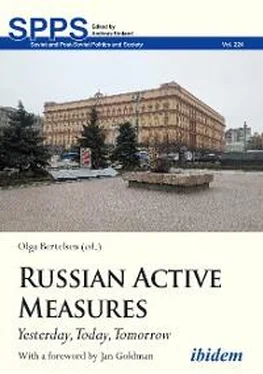1 ...6 7 8 10 11 12 ...24 38Kalugin, Spymaster , 442.
39Agnotology refers to the “study of the deliberate manufacture of ignorance or doubt, including the spread of selective, inaccurate or misleading scientific data.” See John Launer, “The Production of Ignorance,” Postgraduate Medical Journal 96, no. 1133 (2020): 179–80; also available at https://pmj.bmj.com/content/postgradmedj/96/1133/179.full.pdf (accessed 19 June 2020).
40Theodor W. Adorno, “Messages in a Bottle,” in Mapping Ideology , ed. Slavoj Žižek (London: Verso, 2012), 35.
41Alexander J. Motyl, “Putin’s Russia as a Fascist Political System,” Communist and Post-Communist Studies 49, no. 1 (2016): 25–36.
42U.S. House of Representatives, Committee on Foreign Affairs, From Competition to Collaboration: Strengthening the U.S.-Russian Relationship: Hearing before the Committee on Foreign Affairs , 111th Cong, 1st Sess., 25 February 2009 (Washington, D.C.: U.S. Government Printing Office, 2009); also available at https://www.govinfo.gov/content/pkg/CHRG-111hhrg47667/html/CHRG-111hhrg47667.htm (accessed 20 June 2020); see also Ashish Kumar Sen, “Will Sanctions on Russia, Weapons for Ukrainians, Keep Putin at Bay?,” Atlantic Council , 7 April 2015, https://www.atlanticcouncil.org/blogs/ukrainealert/will-sanctions-on-russia-weapons-for-ukrainians-keep-putin-at-bay/ (accessed 20 June 2020).
The Many Faces of the New Information Warfare
Marcel H. Van Herpen
In the last ten to fifteen years the world has been confronted with a new phenomenon—information warfare. It is called a “war” and sometimes, as was the case in 2008 when Russia invaded Georgia, part of a real kinetic war. However, in most cases this war is being fought in areas of the world which are at peace. For this reason, a new term has been coined—a “hybrid war,” a state between war and peace that in many respects resembles the Cold War. At times, a conflict takes on the character of a kinetic war, fought with soldiers and weapons. Yet, more often than not, the kinetic aspect of military action, involving lethal force, is missing from the picture. One of the features of a hybrid war is secretiveness: the aggressors try to conceal their involvement. They do not acknowledge that they are waging a war. For this reason, for the aggressors, plausible deniability is important. Plausible deniability means that the attacking party is able to deny its knowledge of or responsibility for hostile actions conducted by its agencies or by third parties under its control, such as so-called “separatists” in Ukraine’s occupied Donbas region, manipulated and supported by the Russian Federation. Although there is ample evidence to suggest that that these separatists are controlled, instructed, armed, and manipulated by the Russian Federation, the Kremlin stubbornly denies its involvement in the region, arguing that this is not a war of aggression, but a civil war, waged by “separatists” who refused to accept a new, illegal, and “fascist” government in Kyiv ,installed after the Maidan revolution.
“Hybrid war” and “plausible deniability” are the two characteristics of new information warfare, a war that is hidden and non-declared, in which the aggressor denies responsibility for the casualties and damage this war causes. Often, the damage is substantial. For instance, cyberattacks might bring the economies of entire countries to a standstill, paralyzing electricity grids and the air traffic, and putting people’s lives in jeopardy in dysfunctional hospitals. Manipulating public opinion and meddling in the electoral process might have even more damaging and enduring consequences. These actions might undermine democratic governments and challenge the values on which these democracies are built.
A Russian Vision: The First and Second Global Information Wars
For aforementioned reasons, the phenomenon of a hybrid war deserves close attention. It seems prudent to begin its analysis with an explanation offered by Igor Panarin, a Russian scholar, an expert in Russian information warfare, and a former KGB agent who has recently become Dean of the Diplomatic Academy of the Foreign Ministry of the Russian Federation. His contribution to the knowledge of young diplomats about information warfare is significant. In 2010, Panarin published a book on the topic entitled The First Global Information War: The Collapse of the USSR. 1A Western reader might be surprised with its content because, unlike Western analysts who believe that a global information war has begun in the first decade of the twenty-first century, Panarin claimed that the war began much earlier, during the pre-Internet and social media era. He even offered the exact year (1943) and the place (the city of Quebec, Canada) where the “first global information war” began.
In August 1943, there was a summit in Quebec, where Franklin Roosevelt, Winston Churchill, and the Canadian Prime Minister Mackenzie King met. According to Panarin, Churchill instigated the information war against the Soviet Union, and its objectives included “weakening the competitor, [and] its economic and geopolitical expansion,” which would ultimately lead to the “destruction (disintegration) of [our] main ideological and geopolitical opponent—the USSR.” 2The beginning of this information war was unsuccessful because of the “heroic resistance” of Joseph Stalin, whom Panarin profoundly praised in his text. However, the situation changed after Stalin’s death in 1953, when the CIA and the British MI6 launched the “Operation Anti-Stalin.” Nikita Khrushchev was the ideal target for this operation. He was the “anti-Stalin” who provided the Anglo-Americans with an “opportunity to break up the USSR.” 3But they had to wait a bit longer to celebrate the final victory. The advent of Mikhail Gorbachev, whose election was “a victory for those who promoted him,” facilitated their task. 4The first global information war ended with the demise of the Soviet Union which, according to Panarin, was a Western plot, organized by Churchill as early as 1943.
Yet, this was only part of the story. In his second book entitled Information War, PR, and World Politics published in 2014, Panarin described the second global information war. He argued that, initiated again by the West, the second information war began in the 1990s, but this time this war would be won by Russia. According to Panarin, Russia’s victory would be conditioned by several factors, including the Russian political elite’s passion and its preparedness for the “global uncompromising informational-psychological confrontation with the global elites [the US and the UK].” 5
Interestingly, Panarin’s texts open a window into how the Russians view information warfare and how they perceive the West’s tactics and strategies vis-à-vis Russia. First, we learn that the representatives of the highest echelons of Russia’s Ministry of Foreign Affairs support conspiracy theories and build on them. Second, they believe that Khrushchev and Gorbachev were “foreign agents” who were placed in their posts by foreign powers. Third, they suggest that the information war that began in 1943 has never ceased, and has been extended by the West even after the demise of the Soviet Union. Finally, there is a certain optimism among them about Russia’s eventual victory, and this victory is imminent. Moreover, Panarin predicted that this war would be won in 2020, which means that we might be witnessing Russia’s victory this year, now, any moment, in fact.
Let us take a pause here and think what happened between 2010 and 2014, the time when Panarin published his books, and a situation, in which we live today. In the United States Donald Trump was elected President; the Brexit referendum occurred in Britain; and separatist movements unraveled in Catalonia. Russia seems to play an active role in these events.
Читать дальше












